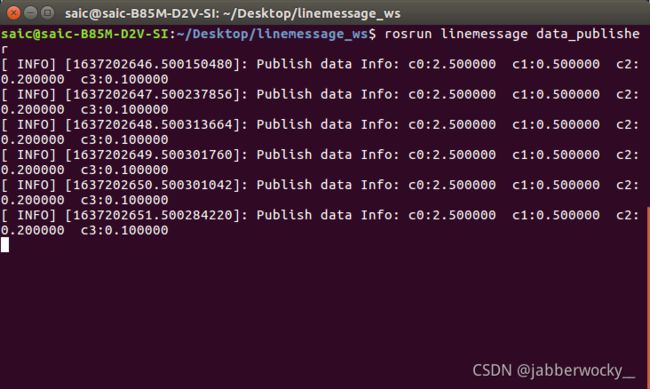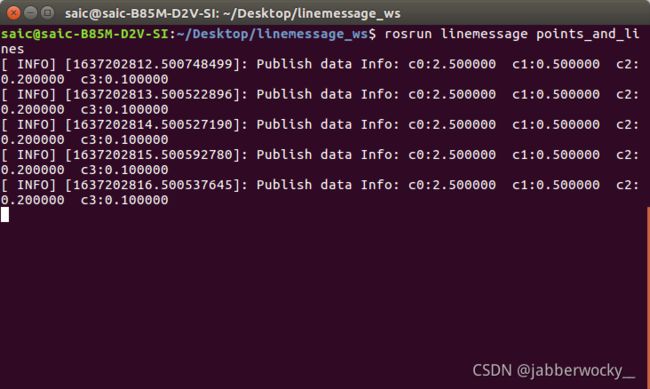ROS下订阅消息并对消息进行处理
ROS下订阅自定义的消息并对消息进行处理
-
- 前言
- ROS自定义msg
- publisher发布
- subscriber订阅
- 对订阅的消息进行处理
- CMakeLists编译
- 结果展示
前言
站内已经有很多博客文章教程帮助实现订阅ROS消息并直接输出到terminal下。本文研究如何进一步对订阅的消息进行简单的处理。本文的例子实现了以下过程:
1.自定义了四个参数{c0, c1, c2, c3}并通过publisher发布到ros节点中;
2.订阅publisher里面的消息,将其作为曲线三次方程的系数,在rviz下画出这条线。
以下是实现的过程:
ROS自定义msg
参考这篇博文
- 新建工作空间linemessage_ws/src
- 在src目录下初始化
catkin_init_workspace
- 在src目录下建立pkg
catkin_create_pkg linemessage roscpp rospy visualization_msgs std_msgs
- 返回工作空间linemessage_ws并运行
catkin_make
- 进入linemessage_ws/src下的linemessage文件夹并在此目录下新建msg文件夹
- 在msg文件夹下新建data.msg文件,在data.msg中自定义自己的消息
float32 c0
float32 c1
float32 c2
float32 c3
- 保存后在msg文件夹同级目录中编辑CMakeLists.txt文件,主要编辑内容为:
在find_package中添加message_generation
在find_package后添加
add_message_files(FILES data.msg)
generate_messages(DEPENDENCIES std_msgs)
在catkin_package中添加
CATKIN_DEPENDS roscpp rospy std_msgs visualization_msgs message_runtime
- 编辑package.xml文件
<?xml version="1.0"?>
<package format="2">
<name>linemessage</name>
<version>0.0.0</version>
<description>The linemessage package</description>
<!-- One maintainer tag required, multiple allowed, one person per tag -->
<!-- Example: -->
<!-- <maintainer email="[email protected]">Jane Doe</maintainer> -->
<maintainer email="[email protected]">saic</maintainer>
<!-- One license tag required, multiple allowed, one license per tag -->
<!-- Commonly used license strings: -->
<!-- BSD, MIT, Boost Software License, GPLv2, GPLv3, LGPLv2.1, LGPLv3 -->
<license>TODO</license>
<!-- Url tags are optional, but multiple are allowed, one per tag -->
<!-- Optional attribute type can be: website, bugtracker, or repository -->
<!-- Example: -->
<!-- <url type="website">http://wiki.ros.org/linemessage</url> -->
<!-- Author tags are optional, multiple are allowed, one per tag -->
<!-- Authors do not have to be maintainers, but could be -->
<!-- Example: -->
<!-- <author email="[email protected]">Jane Doe</author> -->
<!-- The *depend tags are used to specify dependencies -->
<!-- Dependencies can be catkin packages or system dependencies -->
<!-- Examples: -->
<!-- Use depend as a shortcut for packages that are both build and exec dependencies -->
<!-- <depend>roscpp</depend> -->
<!-- Note that this is equivalent to the following: -->
<!-- <build_depend>roscpp</build_depend> -->
<!-- <exec_depend>roscpp</exec_depend> -->
<!-- Use build_depend for packages you need at compile time: -->
<!-- <build_depend>message_generation</build_depend> -->
<!-- Use build_export_depend for packages you need in order to build against this package: -->
<!-- <build_export_depend>message_generation</build_export_depend> -->
<!-- Use buildtool_depend for build tool packages: -->
<!-- <buildtool_depend>catkin</buildtool_depend> -->
<!-- Use exec_depend for packages you need at runtime: -->
<!-- <exec_depend>message_runtime</exec_depend> -->
<!-- Use test_depend for packages you need only for testing: -->
<!-- <test_depend>gtest</test_depend> -->
<!-- Use doc_depend for packages you need only for building documentation: -->
<!-- <doc_depend>doxygen</doc_depend> -->
<buildtool_depend>catkin</buildtool_depend>
<build_depend>roscpp</build_depend>
<build_depend>rospy</build_depend>
<build_depend>std_msgs</build_depend>
<build_depend>visualization_msgs</build_depend>
<build_export_depend>roscpp</build_export_depend>
<build_export_depend>rospy</build_export_depend>
<build_export_depend>std_msgs</build_export_depend>
<build_export_depend>visualization_msgs</build_export_depend>
<exec_depend>roscpp</exec_depend>
<exec_depend>rospy</exec_depend>
<exec_depend>std_msgs</exec_depend>
<exec_depend>visualization_msgs</exec_depend>
<build_depend>message_generation</build_depend>
<exec_depend>message_runtime</exec_depend>
<!-- The export tag contains other, unspecified, tags -->
<export>
<!-- Other tools can request additional information be placed here -->
</export>
</package>
- 保存后回到工作空间linemessage_ws并运行
catkin_make
publisher发布
参考这篇博文
在linemessage_ws/src/linemessage/src目录下新建publisher.cpp文件,输入代码如下
#include <ros/ros.h>
#include "linemessage/data.h"
int main(int argc, char **argv)
{
ros::init(argc, argv, "data_publisher");
ros::NodeHandle n;
ros::Publisher data_info_pub = n.advertise<linemessage::data>("/data_info", 10);
ros::Rate loop_rate(1);
int count = 0;
while (ros::ok())
{
linemessage::data data_msg;
data_msg.c0 = 2.5f;
data_msg.c1 = 0.5f;
data_msg.c2 = 0.2f;
data_msg.c3 = 0.1f;
data_info_pub.publish(data_msg);
ROS_INFO("Publish data Info: c0:%f c1:%f c2:%f c3:%f",
data_msg.c0, data_msg.c1, data_msg.c2, data_msg.c3);
loop_rate.sleep();
}
return 0;
}
输入完并保存。
subscriber订阅
在linemessage_ws/src/linemessage/src目录下新建subscriber.cpp文件,输入代码如下
#include <ros/ros.h>
#include "linemessage/data.h"
void dataInfoCallback(const linemessage::data::ConstPtr& msg)
{
ROS_INFO("Publish data Info: c0:%f c1:%f c2:%f c3:%f",
msg->c0, msg->c1, msg->c2, msg->c3);
}
int main(int argc, char **argv)
{
ros::init(argc, argv, "data_subscriber");
ros::NodeHandle n;
ros::Subscriber data_info_sub = n.subscribe("/data_info", 10, dataInfoCallback);
ros::spin();
return 0;
}
输入完并保存。
对订阅的消息进行处理
参考ROS官方教程
参考这篇博文
与subscriber.cpp类似的订阅方法,实现订阅publisher里面的消息,将其作为曲线三次方程的系数,在rviz下画出这条线。在linemessage_ws/src/linemessage/src目录下新建points_and_lines.cpp文件,输入代码如下
#include <ros/ros.h>
#include <visualization_msgs/Marker.h>
#include "linemessage/data.h"
#include <cmath>
class points_and_lines
{
private:
ros::NodeHandle n;
ros::Subscriber data_info_sub;
ros::Publisher marker_pub;
public:
points_and_lines()
{
data_info_sub = n.subscribe("/data_info", 10, &points_and_lines::dataInfoCallback, this);
marker_pub = n.advertise<visualization_msgs::Marker>("visualization_marker", 10);
}
void dataInfoCallback(const linemessage::data::ConstPtr& msg);
};
void points_and_lines::dataInfoCallback(const linemessage::data::ConstPtr& msg)
{
ROS_INFO("Publish data Info: c0:%f c1:%f c2:%f c3:%f",
msg->c0, msg->c1, msg->c2, msg->c3);
float c0 = msg->c0;
float c1 = msg->c1;
float c2 = msg->c2;
float c3 = msg->c3;
ros::Rate r(30);
float f = 0.0;
visualization_msgs::Marker points, line_strip, line_list;
points.header.frame_id = line_strip.header.frame_id = line_list.header.frame_id = "map";
points.header.stamp = line_strip.header.stamp = line_list.header.stamp = ros::Time::now();
points.ns = line_strip.ns = line_list.ns = "points_and_lines";
points.action = line_strip.action = line_list.action = visualization_msgs::Marker::ADD;
points.pose.orientation.w = line_strip.pose.orientation.w = line_list.pose.orientation.w = 1.0;
points.id = 0;
line_strip.id = 1;
line_list.id = 2;
points.type = visualization_msgs::Marker::POINTS;
line_strip.type = visualization_msgs::Marker::LINE_STRIP;
line_list.type = visualization_msgs::Marker::LINE_LIST;
// POINTS markers use x and y scale for width/height respectively
points.scale.x = 0.2;
points.scale.y = 0.2;
// LINE_STRIP/LINE_LIST markers use only the x component of scale, for the line width
line_strip.scale.x = 0.1;
line_list.scale.x = 0.1;
// Points are green
points.color.g = 1.0f;
points.color.a = 0.0;
// Line strip is blue
line_strip.color.b = 1.0;
line_strip.color.a = 1.0;
// Line list is red
line_list.color.r = 1.0;
line_list.color.a = 0.0;
// Create the vertices for the points and lines
for (uint32_t i = 0; i < 100; ++i)
{
float y = c3*i*i*i + c2*i*i + c1*i + c0;
float z = 0;
geometry_msgs::Point p;
p.x = (int32_t)i;
p.y = y;
p.z = z;
points.points.push_back(p);
line_strip.points.push_back(p);
// The line list needs two points for each line
line_list.points.push_back(p);
p.z += 1.0;
line_list.points.push_back(p);
}
marker_pub.publish(points);
marker_pub.publish(line_strip);
marker_pub.publish(line_list);
r.sleep();
}
int main( int argc, char** argv )
{
ros::init(argc, argv, "points_and_lines");
//ros::Subscriber data_info_sub = n.subscribe("/data_info", 10, dataInfoCallback);
//ros::Publisher marker_pub = n.advertise("visualization_marker", 10);
//ros::Rate r(30);
//float f = 0.0;
/* float c0 = 1.0;
float c1 = 1.1;
float c2 = 1.2;
float c3 = 1.3;*/
points_and_lines pal;
ros::spin();
return 0;
}
输入完并保存。
CMakeLists编译
编译使用CMakeLists比较简单,在linemessage_ws/src/linemessage目录下的CMakeLists.txt末尾添加下列代码:
add_executable(data_publisher src/publisher.cpp)
target_link_libraries(data_publisher ${
catkin_LIBRARIES})
add_dependencies(data_publisher ${
PROJECT_NAME}_generate_messages_cpp)
add_executable(data_subscriber src/subscriber.cpp)
target_link_libraries(data_subscriber ${
catkin_LIBRARIES})
add_dependencies(data_subscriber ${
PROJECT_NAME}_generate_messages_cpp)
add_executable(points_and_lines src/points_and_lines.cpp)
target_link_libraries(points_and_lines ${
catkin_LIBRARIES})
add_dependencies(points_and_lines ${
PROJECT_NAME}_generate_messages_cpp)
整个CMakeLists.txt的代码为
cmake_minimum_required(VERSION 3.0.2)
project(linemessage)
## Compile as C++11, supported in ROS Kinetic and newer
# add_compile_options(-std=c++11)
## Find catkin macros and libraries
## if COMPONENTS list like find_package(catkin REQUIRED COMPONENTS xyz)
## is used, also find other catkin packages
find_package(catkin REQUIRED COMPONENTS
roscpp
rospy
std_msgs
visualization_msgs
message_generation
)
## System dependencies are found with CMake's conventions
# find_package(Boost REQUIRED COMPONENTS system)
## Uncomment this if the package has a setup.py. This macro ensures
## modules and global scripts declared therein get installed
## See http://ros.org/doc/api/catkin/html/user_guide/setup_dot_py.html
# catkin_python_setup()
################################################
## Declare ROS messages, services and actions ##
################################################
## To declare and build messages, services or actions from within this
## package, follow these steps:
## * Let MSG_DEP_SET be the set of packages whose message types you use in
## your messages/services/actions (e.g. std_msgs, actionlib_msgs, ...).
## * In the file package.xml:
## * add a build_depend tag for "message_generation"
## * add a build_depend and a exec_depend tag for each package in MSG_DEP_SET
## * If MSG_DEP_SET isn't empty the following dependency has been pulled in
## but can be declared for certainty nonetheless:
## * add a exec_depend tag for "message_runtime"
## * In this file (CMakeLists.txt):
## * add "message_generation" and every package in MSG_DEP_SET to
## find_package(catkin REQUIRED COMPONENTS ...)
## * add "message_runtime" and every package in MSG_DEP_SET to
## catkin_package(CATKIN_DEPENDS ...)
## * uncomment the add_*_files sections below as needed
## and list every .msg/.srv/.action file to be processed
## * uncomment the generate_messages entry below
## * add every package in MSG_DEP_SET to generate_messages(DEPENDENCIES ...)
## Generate messages in the 'msg' folder
# add_message_files(
# FILES
# Message1.msg
# Message2.msg
# )
## Generate services in the 'srv' folder
# add_service_files(
# FILES
# Service1.srv
# Service2.srv
# )
## Generate actions in the 'action' folder
# add_action_files(
# FILES
# Action1.action
# Action2.action
# )
## Generate added messages and services with any dependencies listed here
# generate_messages(
# DEPENDENCIES
# std_msgs# visualization_msgs
# )
add_message_files(FILES data.msg)
generate_messages(DEPENDENCIES std_msgs)
################################################
## Declare ROS dynamic reconfigure parameters ##
################################################
## To declare and build dynamic reconfigure parameters within this
## package, follow these steps:
## * In the file package.xml:
## * add a build_depend and a exec_depend tag for "dynamic_reconfigure"
## * In this file (CMakeLists.txt):
## * add "dynamic_reconfigure" to
## find_package(catkin REQUIRED COMPONENTS ...)
## * uncomment the "generate_dynamic_reconfigure_options" section below
## and list every .cfg file to be processed
## Generate dynamic reconfigure parameters in the 'cfg' folder
# generate_dynamic_reconfigure_options(
# cfg/DynReconf1.cfg
# cfg/DynReconf2.cfg
# )
###################################
## catkin specific configuration ##
###################################
## The catkin_package macro generates cmake config files for your package
## Declare things to be passed to dependent projects
## INCLUDE_DIRS: uncomment this if your package contains header files
## LIBRARIES: libraries you create in this project that dependent projects also need
## CATKIN_DEPENDS: catkin_packages dependent projects also need
## DEPENDS: system dependencies of this project that dependent projects also need
catkin_package(
# INCLUDE_DIRS include
# LIBRARIES linemessage
CATKIN_DEPENDS roscpp rospy std_msgs visualization_msgs message_runtime
# DEPENDS system_lib
)
###########
## Build ##
###########
## Specify additional locations of header files
## Your package locations should be listed before other locations
include_directories(
# include
${
catkin_INCLUDE_DIRS}
)
## Declare a C++ library
# add_library(${
PROJECT_NAME}
# src/${
PROJECT_NAME}/linemessage.cpp
# )
## Add cmake target dependencies of the library
## as an example, code may need to be generated before libraries
## either from message generation or dynamic reconfigure
# add_dependencies(${
PROJECT_NAME} ${
${
PROJECT_NAME}_EXPORTED_TARGETS} ${
catkin_EXPORTED_TARGETS})
## Declare a C++ executable
## With catkin_make all packages are built within a single CMake context
## The recommended prefix ensures that target names across packages don't collide
# add_executable(${
PROJECT_NAME}_node src/linemessage_node.cpp)
## Rename C++ executable without prefix
## The above recommended prefix causes long target names, the following renames the
## target back to the shorter version for ease of user use
## e.g. "rosrun someones_pkg node" instead of "rosrun someones_pkg someones_pkg_node"
# set_target_properties(${
PROJECT_NAME}_node PROPERTIES OUTPUT_NAME node PREFIX "")
## Add cmake target dependencies of the executable
## same as for the library above
# add_dependencies(${
PROJECT_NAME}_node ${
${
PROJECT_NAME}_EXPORTED_TARGETS} ${
catkin_EXPORTED_TARGETS})
## Specify libraries to link a library or executable target against
# target_link_libraries(${
PROJECT_NAME}_node
# ${
catkin_LIBRARIES}
# )
#############
## Install ##
#############
# all install targets should use catkin DESTINATION variables
# See http://ros.org/doc/api/catkin/html/adv_user_guide/variables.html
## Mark executable scripts (Python etc.) for installation
## in contrast to setup.py, you can choose the destination
# catkin_install_python(PROGRAMS
# scripts/my_python_script
# DESTINATION ${
CATKIN_PACKAGE_BIN_DESTINATION}
# )
## Mark executables for installation
## See http://docs.ros.org/melodic/api/catkin/html/howto/format1/building_executables.html
# install(TARGETS ${
PROJECT_NAME}_node
# RUNTIME DESTINATION ${
CATKIN_PACKAGE_BIN_DESTINATION}
# )
## Mark libraries for installation
## See http://docs.ros.org/melodic/api/catkin/html/howto/format1/building_libraries.html
# install(TARGETS ${
PROJECT_NAME}
# ARCHIVE DESTINATION ${
CATKIN_PACKAGE_LIB_DESTINATION}
# LIBRARY DESTINATION ${
CATKIN_PACKAGE_LIB_DESTINATION}
# RUNTIME DESTINATION ${
CATKIN_GLOBAL_BIN_DESTINATION}
# )
## Mark cpp header files for installation
# install(DIRECTORY include/${
PROJECT_NAME}/
# DESTINATION ${
CATKIN_PACKAGE_INCLUDE_DESTINATION}
# FILES_MATCHING PATTERN "*.h"
# PATTERN ".svn" EXCLUDE
# )
## Mark other files for installation (e.g. launch and bag files, etc.)
# install(FILES
# # myfile1
# # myfile2
# DESTINATION ${
CATKIN_PACKAGE_SHARE_DESTINATION}
# )
#############
## Testing ##
#############
## Add gtest based cpp test target and link libraries
# catkin_add_gtest(${
PROJECT_NAME}-test test/test_linemessage.cpp)
# if(TARGET ${
PROJECT_NAME}-test)
# target_link_libraries(${
PROJECT_NAME}-test ${
PROJECT_NAME})
# endif()
## Add folders to be run by python nosetests
# catkin_add_nosetests(test)
add_executable(data_publisher src/publisher.cpp)
target_link_libraries(data_publisher ${
catkin_LIBRARIES})
add_dependencies(data_publisher ${
PROJECT_NAME}_generate_messages_cpp)
add_executable(data_subscriber src/subscriber.cpp)
target_link_libraries(data_subscriber ${
catkin_LIBRARIES})
add_dependencies(data_subscriber ${
PROJECT_NAME}_generate_messages_cpp)
add_executable(points_and_lines src/points_and_lines.cpp)
target_link_libraries(points_and_lines ${
catkin_LIBRARIES})
add_dependencies(points_and_lines ${
PROJECT_NAME}_generate_messages_cpp)
结果展示
返回工作空间linemessage_ws目录下,运行
catkin_make
编译完成后运行
roscore
打开一个新的terminal,输入
source devel/setup.sh
然后输入
rosrun linemessage data_publisher
打开新的terminal,输入
source devel/setup.sh
然后输入
rosrun linemessage data_subscriber
打开新的terminal,输入
source devel/setup.sh
然后输入
rosrun linemessage points_and_lines
打开新的terminal,输入
rviz
打开rviz,点击add,在By topic选项卡下选中/visualization_maker下的Marker,点击OK,可在rviz界面下看到如下效果

至此,生成完毕。
相关程序已经上传到CSDN下载
下载界面


